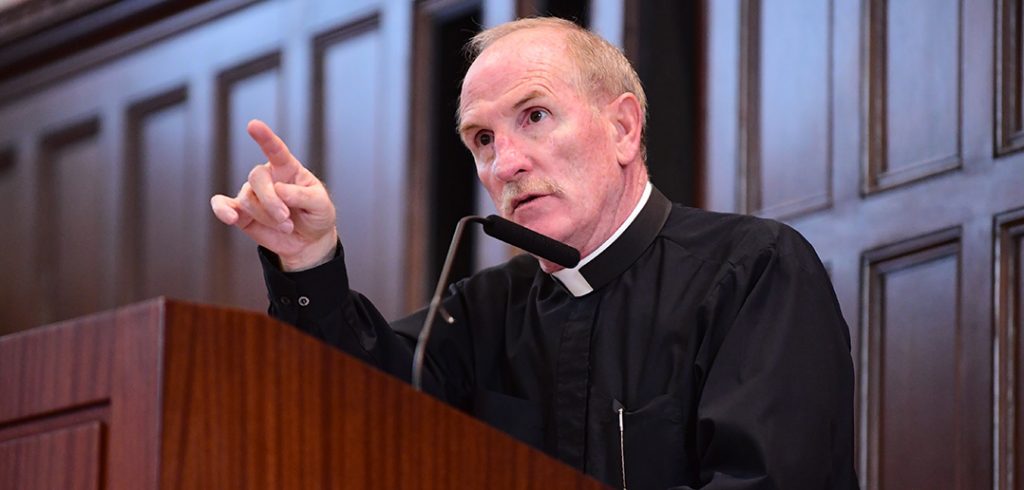On Sept. 7, the University community was welcomed back to campus with the customary fall convocation speech by Joseph M. McShane S.J., president of Fordham. The speech detailed everything from the University’s finances to the achievements of students and faculty to the new Starbucks opening on the Rose Hill campus.
But this year’s speech was a bit different.
In an address to faculty and administrators at the Keating First auditorium, Father McShane spoke candidly about two painful issues: The tense negotiations over health insurance changes that the University will implement on January 1, and the fate of undocumented students and their families in light of the ending of Deferred Action for Childhood Arrivals (DACA).
“The State of our University, beloved as it is, is divided. Intellectually, we are strong and getting stronger, but I have to honestly say, our hearts are still shaken by what happened last year,” he said.
A Need For More Transparency
Reflecting on the failures that lead to bruised feelings between the faculty and the administration, he admitted that in retrospect, he could have communicated with the University community more regularly. As a result, Father McShane said he will hold listening sessions on both campuses, and continue to meet with the president of the Faculty Senate and the full Senate on a monthly basis.
In addition, Martha Hirst, senior vice president, chief financial officer, and treasurer will be holding budget forams and town halls on both campuses during both the fall and spring semesters, to better communicate the University’s budget plans.
Going forward, Father McShane asked that members of the Fordham community consider how cura personalis might apply to their interactions with each other.
“Our students know that they are loved, that they’re cared for, they know that they’re taken seriously, and therefore they thrive. We’re excellent at cura personalis with students,” he said.
“We’re not so good with one another all the time. Sometimes we’re great, but not always. Cura personalis is not just a gift we to be given to students. It’s the cement that holds us together. Care for one another, love for one another, respect and reverence for one another. I pledge that to you.”
Challenges Ahead
Stronger bonds will be needed, he said, because although Fordham is in a strong place, it faces challenges in a shrinking college age population in the Northeast, a push for tuition free college in New York State, and demands that higher education alter its approach to better resemble a business, and not a ministry.
On admissions and enrollment, Father McShane reported that the University had its 26th year of application growth, with a 0.7 percent increase over last years’ 44,776. The University met its enrollment goals for the three traditional-age undergraduate colleges, with 2,248 students.
Fordham can do a better job retaining current students and accommodating transfer students, he said, and therefore has created committees to explore possible solutions.
On the graduate level, interdisciplinary, market driven programs, such as the Graduate School of Arts and Science’s Masters in Cybersecurity, are being developed. The Graduate School of Education will this year become home to the International Center for Jesuit Education, enabling it to partner with Jesuit primary and secondary schools around the world.
Growing Stronger
Buoyed by the best fundraising year in the University’s history ($75.9 million in gifts and pledges), the University has raised $110 million toward a $175 million goal in its Faith and Hope Campaign for Financial Aid.
The University has hired Faustino M. Cruz, S.M., the new Dean of the Graduate School of Religion and Religious Education and 49 new tenure-track faculty.
As a result of the Task Force on Diversity that he created last spring, Father McShane noted that the university will soon announce its choice for the newly created position of Chief Diversity Officer. This week, Kay Turner, Esq. former vice president for human resources at the Jersey Institute of Technology, will also join the administration as vice president for human resources.
With regards to DACA, he reiterated the University’s position in support of it, and agreed with Catholic leaders descriptions of its repeal as an abomination, reprehensible, despicable, a betrayal, and downright cruel.
“I would kneel before you if that would help, and ask you to do all you can to protect our students. If any member of the student body approaches you with fears and concerns about their status, receive them with love, refer them to the Counseling Center or to Campus Ministry,” he said.
“As for the University, we will continue to work with the educational associations in Washington, with the Bishops’ Conference and with Congress to do all we can to protect our students.”


